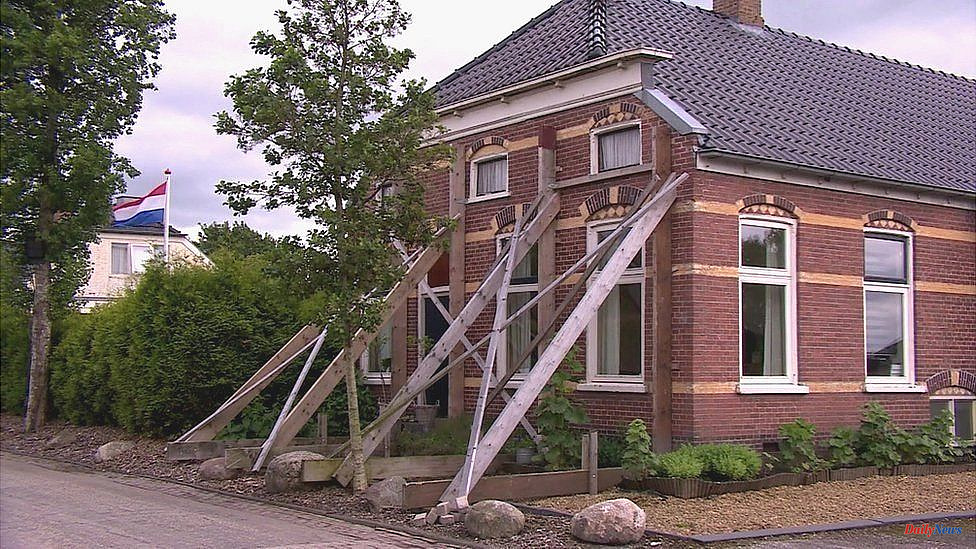Gas that has made the Netherlands wealthy has caused villages and towns to fall apart. The extraction of this resource from Groningen's northern region has resulted in thousands of earthquakes, and entire neighborhoods have been reduced to areas that resemble disaster zones. The war in Ukraine has made it impossible for this to happen.
There are winding canals and a traditional windmill, as well as tulips in bloom. Overschild is a Dutch village, until you look at the houses.
Street after street, homes are covered in scars. Even the 19th century church steeple has a lightning-shaped gash.
Cracks cut through stone walls and floor tiles. Houses have been reinforced and supported by massive wooden beams. A construction truck is often parked in every driveway.
As the houses are unsafe to live in, 80 percent of this village must be demolished.
"We were treated badly. We are basically a colony in the Netherlands. They get all the wealth, and we receive very little in return," says Coert Fossen (chairman of Groningen Earth Movement).
Since 1963, when Exxon Mobil began drilling in the area that was approved by the government, Shell and Exxon Mobil have caused more than 1,000 earthquakes.
According to the latest official estimates, the Dutch state has made EUR417bn (PS358bn or $442bn) since 1965.
Coert, crossing a bridge, explains how gas removal from the Sandstone has caused the land's shift. Some canals that used to flow east-west have changed their direction. When a tremor occurs, cows can be seen running for refuge. He smiles and assures me that these urban legends are real.
We are moving closer to a new neighborhood, housing for hundreds of internally displaced people in the Netherlands.
Coert claims that there are at least four to five of these temporary housing developments in each village.
"People move to this area as their homes are being repaired or dismantled. Their house could be destroyed by an earthquake.
Coert is one of many thousands of victims. He was home in 2012 when the chair on which he was sitting began to shake. He could hear the creaking of the wooden beams above him.
The extraction continues a decade later, and hundreds of homes have been declared unsafe by the Dutch government. Residents are fighting against a system they believe has failed them to pay basic compensation.
Every victim is equally disillusioned that gas is still being taken from their land, despite the fact that they are fighting for it. They want to know the reasons why the nation's wealth was prioritized over the health of its citizens.
We asked Hans Vijlbrief to answer our questions about the minister for extractive industries.
"If you asked how it could have happened in the Netherlands, people didn't believe that." He admits that people in high places had difficulty believing it, referring to 2012's initial earthquakes and the damage they caused.
"This was once something we were proud of. It was a huge accomplishment. It was a huge success. This is how it could have happened in this country.
Groningen's gas field is expected to be closed between 2023-2024.
However, the conflict in Ukraine is forcing governments across Europe to reconsider their dependence on Russian oil and natural gas. Europe is under increasing pressure to find more energy resources closer to home due to rising costs.
People who believed the end was near are now facing greater uncertainty.
Many residents are anxious to know if the closure is going ahead.
Hans Vijlbrief won’t give them.
A second-hand dealer is the best place to go if you want guarantees. The government is putting enormous pressure on me... let's face it, there are big interests pushing me to turn on the tap once more. But I won't do it because it's unsafe and dangerous.
Jannie and Bart Schrage couldn't save their old home.
Jannie shows us the cracks in their tiled floor below the front window and along the wall. Official inspectors could not guarantee that their home would withstand another major earthquake.
It made us feel older. It caused a lot of stress. Heart problems have taken our joy. We're still trying to get back on our feet, but it's hard because it happens around us again and again."
This is a story we have heard many times from families living in the Dutch earthquake zone. Jannie and Bart share with us familiar ringbinders that are filled with evidence from their battles against a bureaucratic structure they believe is designed to hinder than help them in seeking compensation.
Many people resort to borrowing their savings in order to secure a safe place to live.
Mental health has suffered from the insecurity and constant struggle to get their rights recognized.
Tom Postmes, professor of sociology at the University of Groningen told us about a study which found that 16 people per year die in the Groningen earthquake region due to stress from the quakes. All those who died before their time had suffered damage to their homes.
"There is so much wealth to be had that it feels like a bonanza. People feel powerless to stop this."
Some people opposed to any further extraction beyond 2023 are now openly against it due to the conflict in Ukraine and rising energy prices. Many feel the pressure to accept more uncertainty.
Gerry Bulthuis rents in one of these temporary areas, while she waits for her new earthquake-resilient house to be built.
"On one hand, you don't want people left out in the cold; on the other hand, we don't want any more earthquakes."
Coert Fossen, back in the epicenter, is motivated by a sense injustice.
"It angers me because there is a government that allows companies to destroy homes, properties, and people's way of life.












